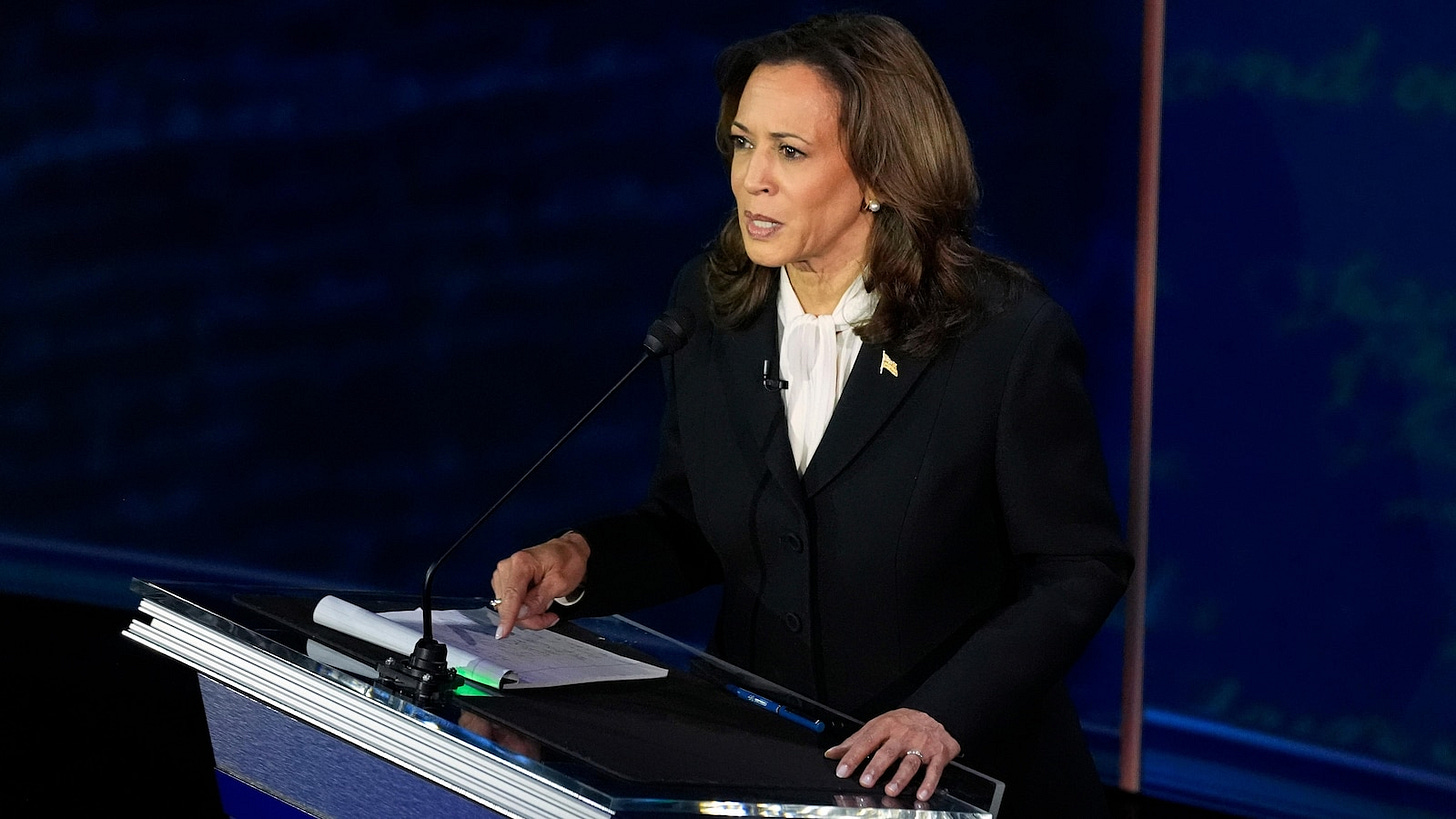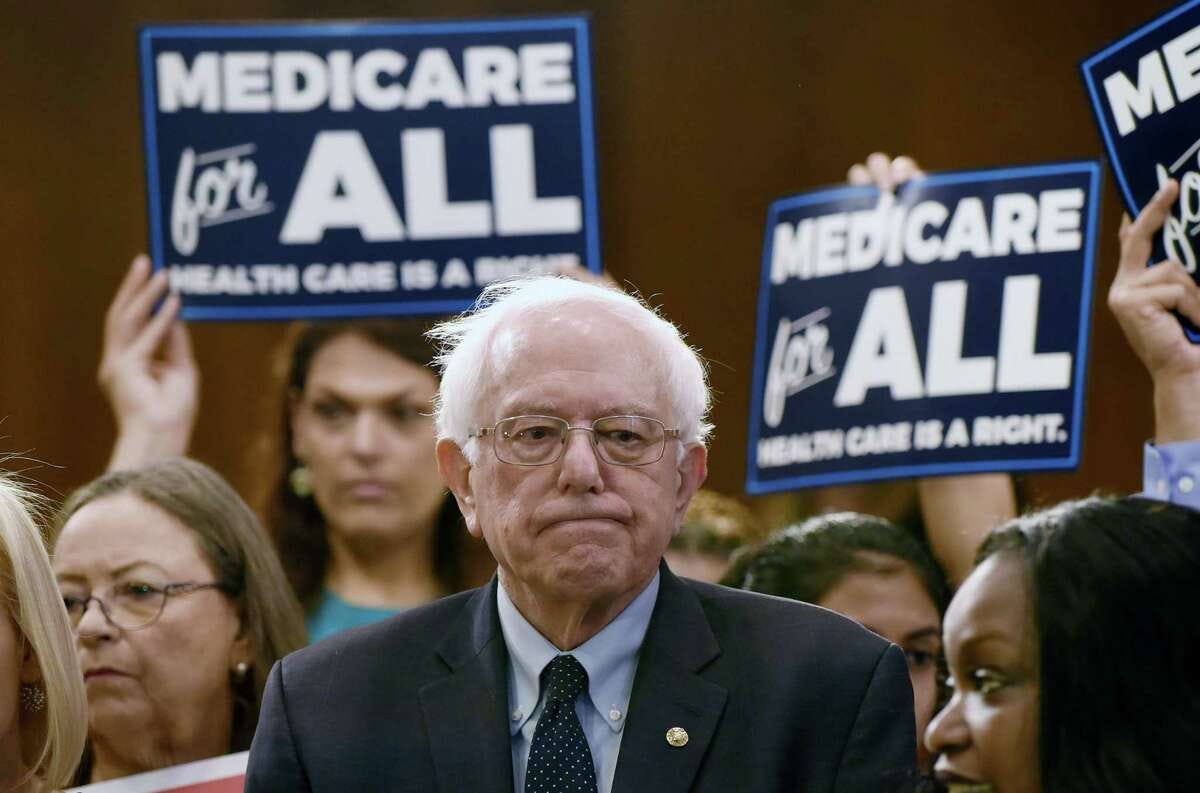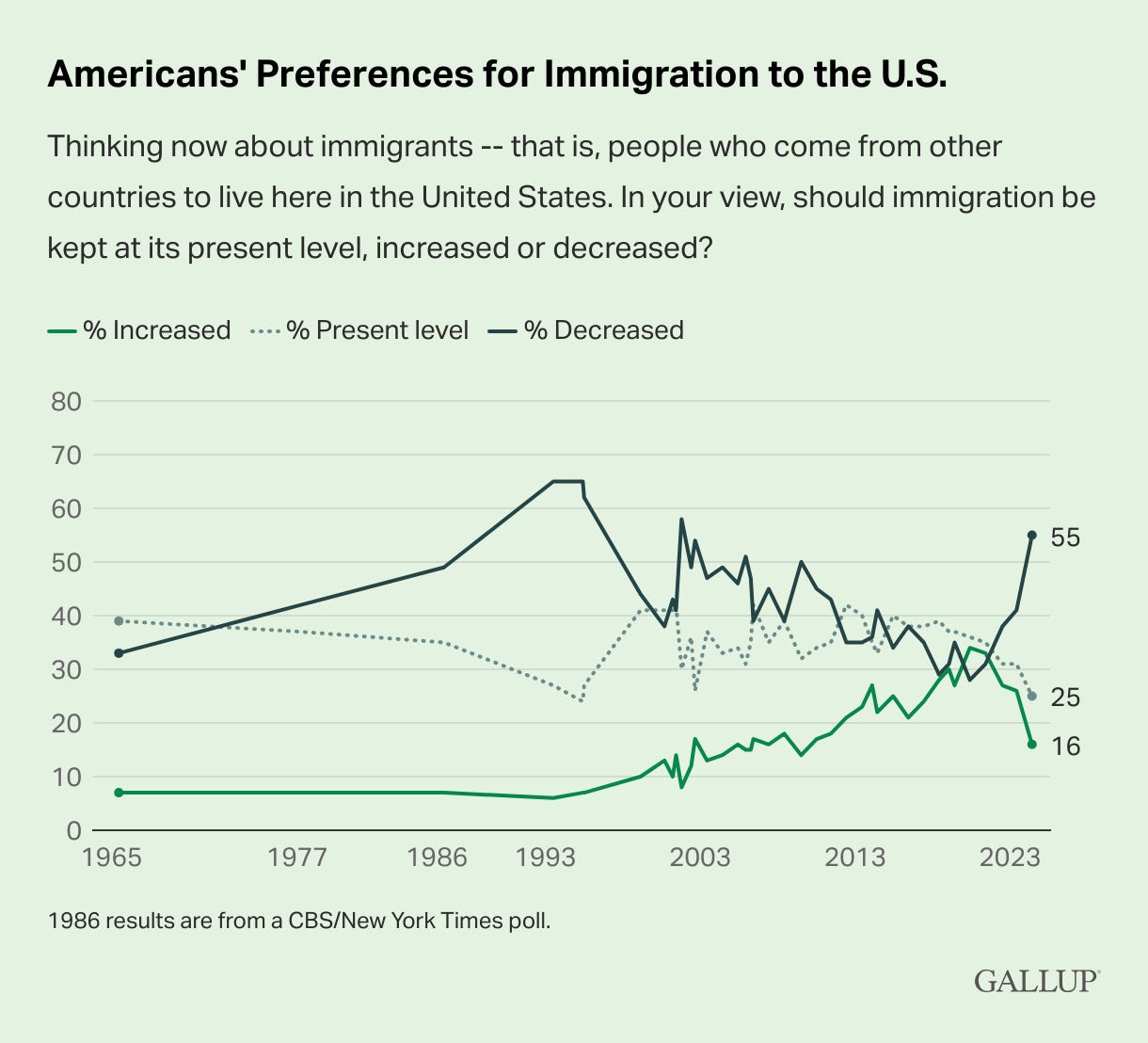Harris unveils her Diet Agenda at the Debate
Unless she can win Democrats the Senate on a difficult map, it may not matter
Election season is full upon us, but it can be a struggle to keep our minds on policy in the midst of partisan mudslinging and campaign noise. Despite casting herself as the mature and serious candidate, Kamala Harris has struggled to convey clarity on a number of policy positions. Part of this is an understandable facet of her fresh candidacy. But neither has she ever acquired a widespread reputation as a policy heavyweight. The debate offered her an opportunity to correct this.
On style and acumen, Kamala Harris managed a successful debate performance. Other factors favor her candidacy, as well. Historian Allan Lichtman says Kamala currently holds eight keys to the White House, when she needs seven to prevail. Polling also shows a narrow path for Trump to the Presidency: he simply must win Pennsylvania. Nonetheless, Kamala Harris could well win the Presidency as Democrats lose the Senate. Aspirants to the Presidency may seek to campaign in poetry and govern in prose, but there will be precious little to govern should the Democrats take the White House and lose the Senate.
Thus, the overall policy agenda matters immensely, even if Harris herself can manage a win without. Harris answered questions about three topics on stage this week: healthcare, immigration, and Israel-Gaza. On two, she stayed on the Centrist course of the Biden administration, and on the third kept resolutely to the Right.
Healthcare
During the debate, Linsey Davis asked:
Vice President Harris, in 2017 you supported Bernie Sanders' proposal to do away with private insurance and create a government-run health care system. Two years later you proposed a plan that included a private insurance option. What is your plan today?
Harris passingly acknowledged her flip-flop against Medicare for All in 2019. It has to be a painful memory for her, as it was a huge part of why her Presidential campaign failed so spectacularly. Instead, she declared she would maintain and grow the Affordable Care Act. She would protect private insurance plans. She celebrated the administration allowing Medicare to negotiate drug prices on behalf of you the American people. She proclaimed, “The plan has to be to strengthen the Affordable Care Act, not get rid of it.”
Harris’s avowal of the Affordable Care Act affirms her total abandonment of Sanders’s Medicare for All bill and cements the effect of the Bernie Blackout. In 2020, Bernie Sanders did well in the early primary contests, dominating Nevada. Democrats felt it necessary to unite against him even after Biden’s victory in South Carolina to quell his bid. This submarine effort surfaced during Biden’s recent attempt to remain in power, when the President portrayed those who asked him to step aside because of the very apparent effects of his age as elites. Former Tennessee Representative Harold Ford Jr. went on TV, indignant, to say: “I resent President Biden … calling, I assume, people like me elites … I was an elite that supported you in 2020. That said that we should do everything we possibly could to advantage you against Bernie Sanders, because I thought Bernie Sanders' politics were detrimental to the party and to the country.” Biden’s view that Sanders’s politics were detrimental outlasted the primaries as he went on to lock Bernie surrogates and people out of his administration entirely. Meanwhile, he generously rewarded Warren’s campaign, putting Bharat Ramamurti, Sasha Baker, Maggie Thomas, and Julie Siegel in the Executive, nominating Rohit Chopra to the Consumer Financial Protection Bureau, and placing her former Chief of Staff, Wally Adeyemo, as deputy Treasury Secretary. Pete Buttigieg became Transportation Secretary; after all, South Bend does have an entire Amtrak station. In stark contrast to Obama’s decision to appoint his most formidable opponent, Hillary Clinton, the weighty position of Secretary of State, Biden offered Sanders and his supporters absolutely nothing. The best the Sanders wing could manage was cancelling the Neera Tanden pick for budget director at OMB, even then only aligning with nearly every other Republican and Joe Manchin. The bitterness displayed in that tussle revealed how Biden had acquired no leverage with Bernie Sanders to convince him to acquiesce to a Democratic appointment to a mid-level position.
Nonetheless, Harris’s position does align well with the Democratic Party apparatus. The Affordable Care Act, also known as Obamacare, was Obama’s prized achievement, of course. It was the Democrats’s long-promised victory, a resolution after decades of shortfalls and half-steps on a burning issue. The Obama administration treasured the PPACA even more so because of its dual purpose: it was a stealth job creation plan. In 2016, one in nine Americans worked in healthcare. Today, just shy of one in seven do.
For Democrats, healthcare now sits as a center of power and influence. It is a draw, and nurses, like teachers or trial lawyers, have become increasingly aligned with the Democratic Party. The Party have enveloped the healthcare industry and can now pump it with money, witness a recent $50 billion proposal to train public health nurses, with expectations of long-term returns, as if the healthcare field were a Democratic fief.
Unfortunately, the healthcare system in America performs quite poorly. Ironically, healthcare remains incredibly unaffordable. A high-income person in the U.S. was more likely to report financial barriers to care than a low-income person in ten other developed countries (Australia, Canada, France, Germany, the Netherlands, New Zealand, Norway, Sweden, Switzerland, and the U.K.). Of these eleven nations, the United States alone lacks universal healthcare.
And although the public may be divided over universal healthcare, Democrats markedly would prefer it. Over 70% of Democrats prefer a government run system to the Affordable Care Act’s regime, or any other based primarily on private insurance. A whopping 88% of Democrats say the Federal government has a responsibility to assure healthcare coverage for all Americans.
Given the Party establishment’s position on the Affordable Care Act, and its Blackout against the Bernie wing and the Left more broadly, Harris’s fealty to Obama’s legacy law seems unsurprising. Many of the increased jobs from the Affordable Care Act, particularly administrative ones, would be eliminated were Medicare For All to become adopted. Nevertheless, it is rather surprising that Harris feels no need to expand on the Affordable Care Act whatsoever. She has not proposed a public option, a clear middle-ground for those who prefer universal healthcare in her party versus a public that marginally opposes government run healthcare. She did not even take up the limited cause of adding dental to Medicare coverage, which has nearly unanimous public support. A balanced but meaningful way to strengthen the Affordable Care Act may be to craft a Federal public option of the kind that a handful of States have tried and struggled to implement.
Instead, Harris has offered the base meager scraps. As it stands, the United States healthcare system is ineffective and extremely unaffordable, only excelling on quality of care processes. Harris has given vulnerable Senators, particularly Tester in Montana or Brown in Ohio, and challengers such as Mucarsel-Powell in Florida, nothing from which to pick up voters. Healthcare under Harris stagnates as a backwater issue, under-cooked and ignored in her simple plea to the public, ‘We are not going back,’ to deny Donald Trump another term.
Immigration
David Muir asked Kamala Harris:
… illegal border crossings reached a record high in the Biden administration. This past June, President Biden imposed tough new asylum restrictions. We know the numbers since then have dropped significantly. But my question to you tonight is why did the administration wait until six months before the election to act and would you have done anything differently from President Biden on this?
Kamala Harris immediately raised how Republicans defeated a border security bill which “would have put 1,500 more border agents on the border to help those folks who are working there right now over time trying to do their job.”
It would have allowed us to stem the flow of fentanyl coming into the United States … put more resources to allow us to prosecute transnational criminal organizations for trafficking in guns, drugs and human beings. But you know what happened to that bill? Donald Trump got on the phone, called up some folks in Congress, and said kill the bill. And you know why? Because he preferred to run on a problem instead of fixing a problem.
The phrasing of the question likely put Harris on the defensive, and she understandably directed viewers to the border bill that went down in Congress. What she did next though was interesting. She followed up with an invitation to go to Donald Trump’s rallies to see “people start leaving his rallies early out of exhaustion and boredom” as he talks about things such as how “windmills cause cancer.” Harris’s pivot perhaps served as an effective tactic (insofar as Trump began talking about cats and dogs in Springfield and not his policy on migrants), but it offers little clarity on her administration’s approach to immigration.
In fact, insofar as the Democrats have traditionally been more open, or at least less restrictionist, than Republicans to immigration, in 2024 they find themselves on the defensive.
Immigration restriction sentiment has skyrocketed to its highest rate since 2001. Three-fourths of Americans support hiring more border agents, a slim majority supports a wall at the southern border, and only a slight majority oppose a policy to deport all the undocumented. Four-fifths of Americans would support a path to citizenship for dreamers, however.
Debate Moderator David Muir referenced Biden’s June Executive Order which seals limits asylum to a seven-day average of 2,500 and bar asylum applications until the average falls below 1,500 again. However, his phrasing seems to suggest that this measure just made sense, and should have been adopted a year or more prior. In truth, Biden’s Executive Order violates United States law. The American Bar Association released a statement blasting the Executive Order because it “violates critical provisions of the Immigration and Nationality Act, international law, and due process.” The ACLU and other groups promptly challenged it in court, stating “The administration lacks unilateral authority to override Congress and bar asylum based on how one enters the country.” Muir’s question elides this entire controversy, sweeping under the rug how very similar the Executive Order appears to Trump’s own bans that the courts struck down.
In effect, the Biden-Harris administration has wholly surrendered to Republican immigration restrictionism. Harris sidestepped all this, blaming Republicans in Congress for passing a bill, and then baited Trump, deprecating his rally dynamics. The broader Democratic Party may support Biden’s right-ward lurch in light of Republican reluctance to deal, but the large Congressional Progressive Caucus does not. Chair Rep. Pramila Jayapal called the Order “very, very disappointing … we should be offering the contrast [from Trump.]” On their website, the CPC states that:
Children have been separated from their families, parents have been deported after decades in this country, and Dreamers have spent years of their lives in limbo. The Progressive Caucus supports a full overhaul our inhumane immigration system — including passage of the Dream & Promise Act, a pathway to citizenship for the 11 million undocumented immigrants in the U.S., due process in our immigration system, and a permanent end to xenophobic travel bans.
In response to the Executive Order, several Congressional Democrats launched the Congressional Caucus on Global Migration. According to the Caucus, families around the world are migrating at unprecedented levels “in search of safety and stability” because of a mix of global “violence, civil wars, human rights violations, democratic backsliding, economic exclusion, and climate instability." Co-Chair Delia Ramirez called Democrats “reactive and apologetic,” criticizing them for “a terrible job in actually talking about root causes of migration.” Harris’s debate missive falls all too neatly into that critique.
Israel-Gaza
Vice President twice reiterated that ‘Israel has a right to defend itself.’'
Linsey Davis: Vice President Harris, in December you said, "Israel has a right to defend itself" but you added, "It matters how." Saying international humanitarian law must be respected, Israel must do more to protect innocent civilians. You said that nine months ago. Now an estimated 40,000 Palestinians are dead. Nearly 100 hostages remain. Just last week Prime Minister Benjamin Netanyahu said there's not a deal in the making. President Biden has not been able to break through the stalemate. How would you do it?
Vice President Harris: On Oct. 7, Hamas, a terrorist organization, slaughtered 1,200 Israelis. Many of them young people who were simply attending a concert. Women were horribly raped. And so absolutely, I said then, I say now, Israel has a right to defend itself. We would. And how it does so matters. Because it is also true far too many innocent Palestinians have been killed. Children, mothers. What we know is that this war must end. It must when, end immediately, and the way it will end is we need a cease-fire deal and we need the hostages out. But the one thing I will assure you always, I will always give Israel the ability to defend itself, in particular as it relates to Iran and any threat that Iran and its proxies pose to Israel. But we must have a two-state solution where we can rebuild Gaza, where the Palestinians have security, self-determination and the dignity they so rightly deserve.
Harris is patently wrong. To start, Israel has no right under international law to characterize its occupation of Gaza as any sort of legitimate defense.
History did not begin on 7 October, 2023. Rather, by the day before, 2023 already had proven to be the deadliest year on record for Palestinian children. Israel had killed 47 children by 6 October of that year. Harris’s characterization was Far Right from the jump. Israel holds Gaza and the West Bank as a result of the 1967 war, the so-called Six Day War. Israel started that war against Egypt, Jordan, and Syria. Israel conquered Gaza from Egypt and the West Bank from Jordan. Their occupation of each has been as illegal as the war they launched in 1967. As Ralph Wilde explains:
In this context … asking whether Israel has a right to self-defence in international law justifying this action, is to fundamentally mischaracterize the situation …
… If there was no original lawful basis for it to use force then, for that reason or any other, there cannot then be a basis to continue the use of force in response to violent acts of Palestinian resistance to the occupation. A justification for a new phase in an ongoing illegal use of force cannot be constructed solely out of the consequences of violent resistance to that illegal use of force. Otherwise, an illegal use of force would be rendered lawful simply because those subject to this force violently resisted it—a perverse outcome.
Self-defense cannot attach to an illegal occupation, no matter how long Israel defies UN General Assembly orders or ICJ opinions.
Nonetheless, the Democratic Party finds itself awash in AIPAC contributions. Just look at the Senators from Georgia, neither of whom qualify as centrists: between them over $1.6 million in AIPAC money. They have not even served in the Senate very long.
A tremendous amount of money from Israel has corrupted Democratic members of Congress. Even so, roughly half of Democrats boycotted Netanyahu’s speech in July. This symbolism erodes a bit when it comes to palpable relief, however. Only 94 members of Congress have called for a ceasefire. Democrats in Congress have shown remarkable sloth and enervation as Israel pounds a tremendous sweep of civilian infrastructure, including just about every school, hospital, church, and mosque, including the Khan Younis Mosque.
Whereas from 1 January to 6 October, 2023, 47 children had died, within the last year, Israeli bombings and attacks have killed over 20,000 children. Credible accounts detail how Israeli snipers deliberately target children. As the relentless assault on civilian infrastructure approaches nearly a full year, Harris sickeningly and cynically harks upon Israel’s right to self-defense.
She is quite far out of step with Democratic voters and even the entire electorate. 80% of Democrats and 70% of all voters support an immediate ceasefire. It boggles the mind how the Biden-Harris administration can continue to funnel US money to Israel, a burden on US taxpayers, even while 70% of the country wants Israel to stop the carnage. Even so, Harris readily summons the spectre of Hamas rapes to justify months upon months of Israeli killings of Palestinian children as a part of its ongoing illegal and bloody occupation.
How can Kamala Harris wage a campaign against Donald Trump and assert that we must take his ‘threat to democracy’ seriously as she ignores the will of the electorate? She has been unwilling to come to even the center on Israel-Gaza and impose restrictions or a bar on military aid to Israel to prompt a ceasefire. In this case, it does seem that she’s moderately positioned with regard to the polarity of Congress, at least. Unfortunately, that polarity remains corrupt and cash-motivated. Her statements about Palestinian security, self-determination, and dignity ring empty and hollow; the administration can stop the flow of weapons that are destroying Gaza at any moment.
The Fate of the Senate
Upon initially taking office, every Democratic President has entered the White House with partisan control of both the House and Senate since at least 1900. As Kamala Harris consolidates around the Affordable Care Act, retreats from immigration, and flouts international law on Gaza, the 2024 Senate map threatens to finally shatter that streak. Her run resembles more of a Biden re-election for a second-term than a bid of her very own.
The map above portrays a likely, perhaps even favorable outcome for Democrats, assuming they hold Ohio, Wisconsin, Michigan, and Pennsylvania, as well as some others. D incumbent Tester in Montana appears particularly weak. The other possible pick up for Harris may be Florida, where R incumbent Scott often polls within the margin of error. However, Republican flips in one of the aforementioned four states seem equally plausible.
Harris’s play for the White House centers around her thrust to protect reproductive rights; she pledges to sign a bill reinstating the right to an abortion at the Federal level. Yet, the Supreme Court’s Dobbs decision occurred dead within Biden’s first-term. Was this not something Biden could have thwarted when he himself had full control of Congress? Perhaps not with fickle members such as Sinema and newly independent Joe Manchin. At any rate, Harris’s over-reliance on this ploy to correct the Supreme Court’s error reeks of the ratchet effect. Namely, affirmative efforts by Democrats focus inordinately on retrieving losses or protecting gains rather than advancing progress.
As the head of the Democratic Party, Kamala Harris has her choice of how and where to spend political capital. She can preserve the Affordable Care Act, tack right on immigration, and perhaps most cynically even bow to Israel’s bloody interests in Gaza. But if she wants the Senate, she must break free of Biden and find her own cause. A failure to cast any independent affirmative vision will place her in the position of a Biden second-term; holding stunted political capital capable of only symbolic bills and Executive Orders, themselves doomed to review before a Republican-held Supreme Court. The debate reveals that although Kamala Harris remains a favorite to take the White House, she may hold it trapped with a Republican Senate and only a very precarious House Majority. Her safest play will be to discover some passion, some grand cause, beyond just defeating Donald Trump.
Kamala Harris if you really love to cook, then start cooking. And make it a popular dish.














